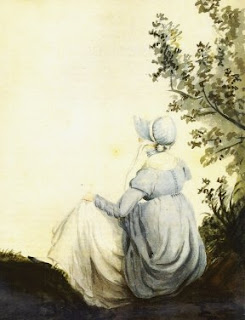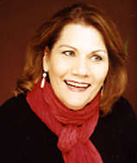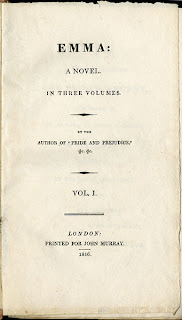Last Saturday one of my favorite events occurred. The Washington Romance Writers meeting when Kathy Gilles Seidel, A WRW member, RITA winner and Austen scholar, speaks about one of Austen’s books and the movies made from it.
This year it was Emma, comparing the book and four movie versions: The Gwyneth Paltrow version, the Kate Beckinsale version, the recent BBC mini-series, and Clueless.
 The very first WRW meeting I ever attended (back in 1995), Kathy spoke on Austen’s use of the celebration in her endings. Being so very new to romance writing and still under the influence of the popular disparaging viewpoint of romance being “less than” real books, I was thrilled beyond words to hear this intelligent discussion. Since then I’ve heard Kathy speak several times on Austen and on other romance-writing topics and she never disappoints.
The very first WRW meeting I ever attended (back in 1995), Kathy spoke on Austen’s use of the celebration in her endings. Being so very new to romance writing and still under the influence of the popular disparaging viewpoint of romance being “less than” real books, I was thrilled beyond words to hear this intelligent discussion. Since then I’ve heard Kathy speak several times on Austen and on other romance-writing topics and she never disappoints.
Kathy usually speaks at our January meeting, cancelled this year due to snow and rescheduled to June. We had a smaller group than usual, probably because it was a beautiful day and a busy time of year. It worked out marvelously, though, because the talk became a discussion, casual enough for everyone to feel comfortable speaking up, light enough for plenty of joking and fun.
Here are a few random points made throughout the day-long workshop.
1. Emma is not a romance, but a “woman’s journey”story and essentially a book about power. As a story about power, the movie that comes closest is Clueless.
2. In Clueless the heroine, Cher, is constantly underestimated; in Austen’s book, Emma is constantly overestimated. She is seen as doing no wrong, but, in reality, she gets everything wrong.
3. As a story about power, Austen shows how the power is shifting in the society of her day. The book shows the rising power of the middle class and the decreasing power of the landed gentry. Emma starts the book with lots of social power in her community, but her power is challenged by the Coles, representing the rising middle class, who almost do not invite her to their party, and, towards the end, by Jane Fairfax, who refuses her visit.
3. Within Emma, there are lots of secrets characters keep from each other, but in the book Austen gives subtle hints as to what is really going on. Sometimes the hints are only a few words in a long paragraph. It takes an alert reader and many readings to catch these subtleties. Because of this (and for many other reasons), the book is a classic where you discover new things with each reading.
4. Jennifer Enderlin, editor-in-chief, St. Martin’s Press, and Kathy’s editor, says that, in the first chapter of a book, the writer should give the reader someone to love and someone to hate. But Austen sets herself a great challenge in that she gives the reader many reasons to dislike Emma in the first chapter, and few reasons to like her. The reader must learn to like Emma as the book progresses.
5. We watched clips of the beginnings of the four movies. The moviemakers, though, tried to give viewers clear reasons to like the Emma character. In Clueless, we can forgive Cher her self-centeredness, because she is a teenager. Paltrow’s and Beckinsale’s Emmas are very sweet, especially to their fathers. The BBC version goes back in time and shows Emma’s mother’s death and really pulls on the viewers’ heartstrings.
There was so much more in this stimulating discussion, plus both lunch and dinner with writing friends. What could be better?
What’s your favorite sort of day among like-minded people?
Did you read Emma or see any of the movies? What’s your take?
Don’t forget the Harlequin Historical Authors Summer Beach Bag Giveaway. Today starts week two with plenty more prizes and more chances to win a Kindle Fire!




